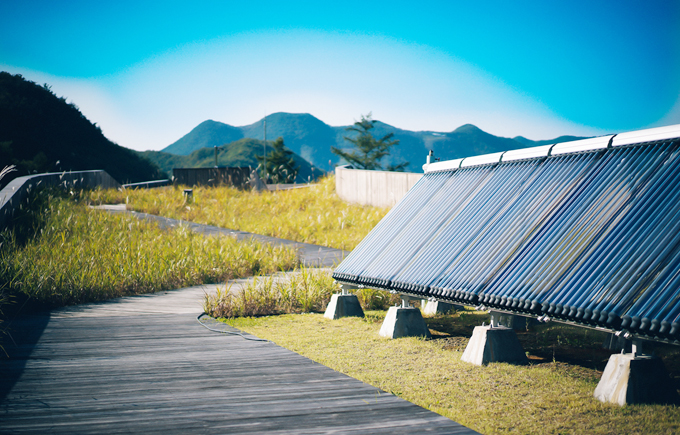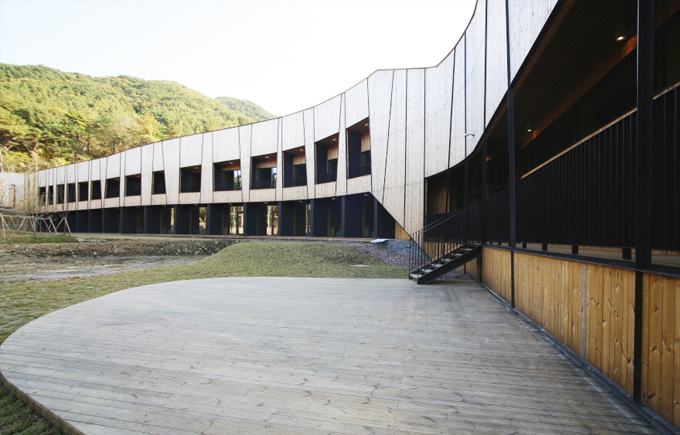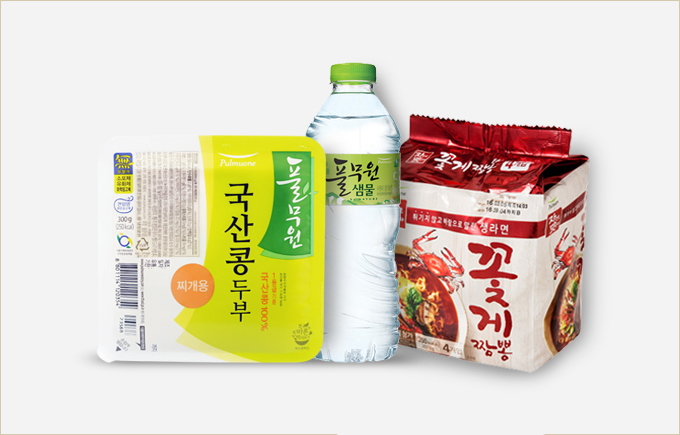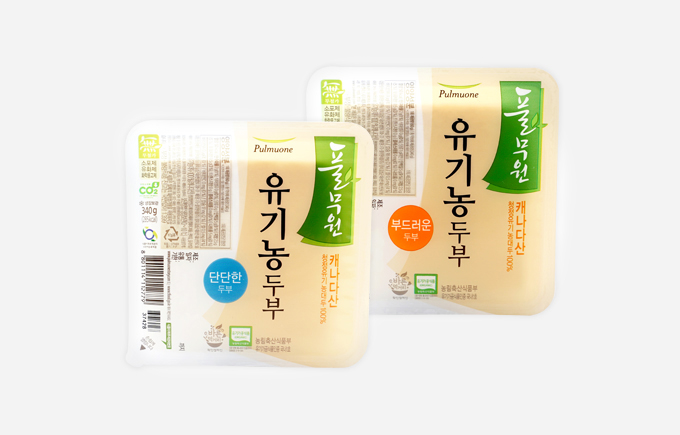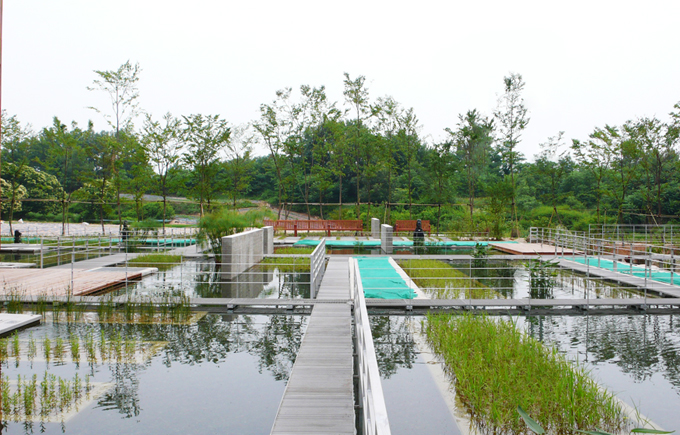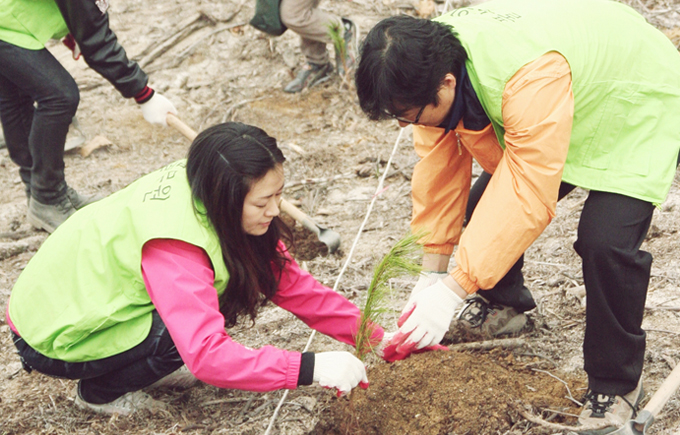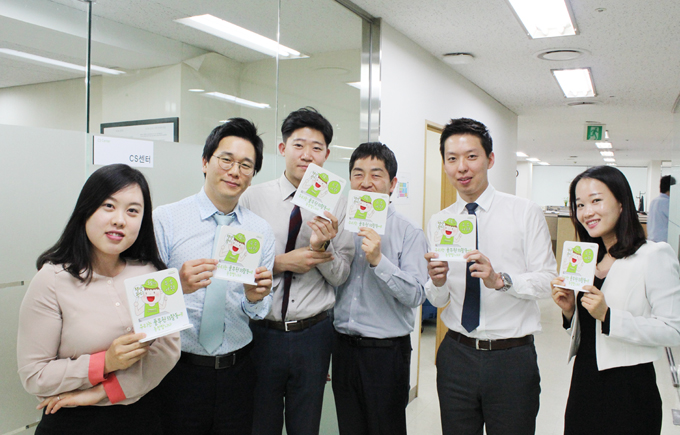- About Us
- Sustainability Management
- Wholesome Foods & LOHAS
- Newsroom
Social Responsibility
With the spirit embodied in our mottos, "love for our neighbors" and "respect for life," we fulfill our social roles and responsibilities.
Mr. Won Kyung-sun, the originator of the Pulmuone spirit as well as a farmer and pacifist, was the first Korean entrepreneur who paid attention to the issue of global famine and began charity work. Mr. Won served as an instructor for Pulmuone's newly hired employees late into his 90s. Whenever he lectured, he shared in detail what to pursue and what to avoid in the name and honor of Pulmuone.
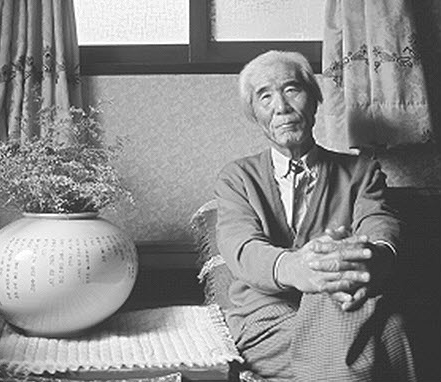
Based on such principles, Pulmuone strives to fulfill its social roles and responsibilities with sincerity. By pursuing the well-being of humanity and the sustainability of the Earth's environment, we seek to realize LOHAS Living and become a sustainable company.
- Pulmuone’s Social Responsibility Outlined in Keywords
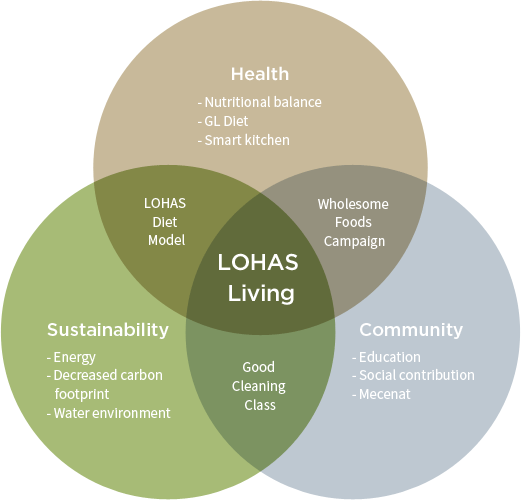
Eliminating any factors that may impact the environment in advance by stringently examining each product and service
Although Pulmuone is not the intended target of the Greenhouse Gas and Energy Management System and Emission Trading System, we are aware of the importance of taking action against climate change as a corporate member of the global community and are implementing policies to reduce greenhouse gas emissions. We have set up and executed a concrete roadmap to decrease water consumption, greenhouse gas emissions, energy consumption, and waste discharge.
- Renewable Energy Sources
- Passive House
- Eco-friendly Packaging
- Carbon Neutral Products with Zero Greenhouse Gas Emissions
- Water Quality Management and Recycling of Used Water
- Carbon Neutral Certification
- Five Ss of a LOHAS Living
Photovoltaic power generation and wooden pellet boilers
Our production facilities draw on renewable energy sources to reduce greenhouse gas and carbon emissions. The green vegetable juice plant and health supplement plant use power generated by a photovoltaic system to operate various types of in-house equipment and offices. The LPG-fueled boilers at the tofu plant and fish cake plant were replaced with boilers that run on wooden pellets, which are a biofuel.
Aesthetically pleasing and sustainable Passive House
The Passive House within Pulmuone’s LOHAS Academy located in Goesan, Chungcheongbuk-do, has become a fertile ground for education on eco-friendly healthy eating centered on wholesome foods. The LOHAS Academy Passive House, created by German architect Gernot Vallentin, who is celebrated for his eco-conscious, technologically innovative designs, is an environmentally responsible energy-saving structure built for this era of climate change. Its energy consumption is 80-90% less compared to buildings without energy-saving features. Aesthetically pleasing and sustainable architectural masterpiece
It became the first architectural structure to win at the Energy Winner Awards (in 2014), receiving acclaim that “it set a new standard for sustainable structures by successfully achieving an eco-friendly layout and design that blends well with its surroundings and realizing excellence on the energy-saving and architectural fronts, unlike existing energy-efficient buildings typically focused on technologies.”
Testament to our rigorous effort to eliminate harmful substances and reduce waste
Pulmuone’s tofu products come in an eco-friendly package made with water-based adhesive that was co-developed by the Ministry of Environment and Pulmuone. It is lightweight, durable, and environmentally responsible. It is strong enough to keep fragile tofu intact yet lighter in weight, which means less packaging materials used and less waste. The bottle used for Pulmuone Waters, our bottled water brand, is the most lightweight among all mineral water products marketed in Korea, while the package of our Spicy Blue Crab Noodle Soup from Nature Is Delicious (Pulmuone’s non-fried fresh ramen brand) is made with water-based ink and adhesive to ensure food safety. We are continuously expanding the eco-friendly packaging policy to other products, including health-enhancing supplements.
Pulmuone’s organic tofu products acquire carbon neutral certification
Two of our organic tofu products have acquired carbon neutral certification for the first time in Korea’s food industry. This certification is awarded to products that are proven to have zero greenhouse gas emissions from manufacturing to distribution, consumption, and discard. We have rigorously pursued the reduction of carbon emissions through energy saving and water saving (such as recycling indirect water as soybean washing water) throughout the entire tofu production process. We continue to proactively engage in activities to reduce carbon emissions, such as the development and application of greenhouse gas reduction technology.
Stringent water quality management and recycling of used water
As a food company, we are well aware of the importance of water. This is why we have long engaged in the restoration of the river ecosystems in the communities we serve. We also strive to improve water quality and reduce water consumption. Our factories that discharge waste water directly into the water system follow reinforced water quality standards for water treatment. These standards uniformly apply to the factories in China and Japan. For Pulmuone Waters, thorough environmental impact evaluations are conducted to maintain the stability of water resources and prevent any impact on the ecosystem. Waste water is treated at the Pulmuone Waste Water Treatment Plant and recycled as much as possible.
Planting trees to offset the carbon footprint of our general shareholders’ meeting
We make sure that our general shareholders’ meeting is eco-friendly and zero-carbon. The podium and other essential items are reused and minimized. We also plant trees to offset the carbon emissions incurred by the meeting, which we calculate by checking participants’ means of transportation.
Five Ss of a LOHAS Living– Sort·Set·Shine·Standardize·Sustain
A LOHAS lifestyle is achieved by changing habits and improving daily living conditions. Individual efforts to reduce water consumption, enhance air quality, and keep the environment clean and tidy contribute to the improvement of living conditions. We carry out the Five Ss Campaign aimed at achieving a true LOHAS lifestyle. The Five Ss are “sort”, “set”, “shine”, “standardize”, and “sustain”.
- Renewable Energy Sources
- Passive House
- Eco-friendly Packaging
- Carbon Neutral Products with Zero Greenhouse Gas Emissions
- Water Quality Management and Recycling of Used Water
- Carbon Neutral Certification
- Five Ss of a LOHAS Living
태양광발전 시스템, 목재펠릿 보일러 등 신재생에너지
풀무원 생산 공장에 신재생에너지를 도입해 온실가스 및 탄소 배출량을 줄여나가고 있습니다. 녹즙 공장, 건강기능식품 공장 등에는 태양광발전 시스템을 도입해 태양광발전으로 생산한 전력을 공장의 유틸리티와 사무실 등 상시 가동시설에서 사용하고 있으며, 풀무원 두부 공장, 어묵 공장 등에서 가동 중인 보일러의 경우 화석연료인 LPG에서 바이오연료인 목재펠릿 보일러로 교체했습니다.
Aesthetically pleasing and sustainable Passive House
The Passive House within Pulmuone’s LOHAS Academy located in Goesan, Chungcheongbuk-do, has become a fertile ground for education on eco-friendly healthy eating centered on wholesome foods. The LOHAS Academy Passive House, created by German architect Gernot Vallentin, who is celebrated for his eco-conscious, technologically innovative designs, is an environmentally responsible energy-saving structure built for this era of climate change. Its energy consumption is 80-90% less compared to buildings without energy-saving features. Aesthetically pleasing and sustainable architectural masterpiece
It became the first architectural structure to win at the Energy Winner Awards (in 2014), receiving acclaim that “it set a new standard for sustainable structures by successfully achieving an eco-friendly layout and design that blends well with its surroundings and realizing excellence on the energy-saving and architectural fronts, unlike existing energy-efficient buildings typically focused on technologies.”
Testament to our rigorous effort to eliminate harmful substances and reduce waste
Pulmuone’s tofu products come in an eco-friendly package made with water-based adhesive that was co-developed by the Ministry of Environment and Pulmuone. It is lightweight, durable, and environmentally responsible. It is strong enough to keep fragile tofu intact yet lighter in weight, which means less packaging materials used and less waste. The bottle used for Pulmuone Waters, our bottled water brand, is the most lightweight among all mineral water products marketed in Korea, while the package of our Spicy Blue Crab Noodle Soup from Nature Is Delicious (Pulmuone’s non-fried fresh ramen brand) is made with water-based ink and adhesive to ensure food safety. We are continuously expanding the eco-friendly packaging policy to other products, including health-enhancing supplements.
Pulmuone’s organic tofu products acquire carbon neutral certification
Two of our organic tofu products have acquired carbon neutral certification for the first time in Korea’s food industry. This certification is awarded to products that are proven to have zero greenhouse gas emissions from manufacturing to distribution, consumption, and discard. We have rigorously pursued the reduction of carbon emissions through energy saving and water saving (such as recycling indirect water as soybean washing water) throughout the entire tofu production process. We continue to proactively engage in activities to reduce carbon emissions, such as the development and application of greenhouse gas reduction technology.
Stringent water quality management and recycling of used water
As a food company, we are well aware of the importance of water. This is why we have long engaged in the restoration of the river ecosystems in the communities we serve. We also strive to improve water quality and reduce water consumption. Our factories that discharge waste water directly into the water system follow reinforced water quality standards for water treatment. These standards uniformly apply to the factories in China and Japan. For Pulmuone Waters, thorough environmental impact evaluations are conducted to maintain the stability of water resources and prevent any impact on the ecosystem. Waste water is treated at the Pulmuone Waste Water Treatment Plant and recycled as much as possible.
Planting trees to offset the carbon footprint of our general shareholders’ meeting
We make sure that our general shareholders’ meeting is eco-friendly and zero-carbon. The podium and other essential items are reused and minimized. We also plant trees to offset the carbon emissions incurred by the meeting, which we calculate by checking participants’ means of transportation.
Five Ss of a LOHAS Living– Sort·Set·Shine·Standardize·Sustain
A LOHAS lifestyle is achieved by changing habits and improving daily living conditions. Individual efforts to reduce water consumption, enhance air quality, and keep the environment clean and tidy contribute to the improvement of living conditions. We carry out the Five Ss Campaign aimed at achieving a true LOHAS lifestyle. The Five Ss are “sort”, “set”, “shine”, “standardize”, and “sustain”.
Pulmuone’s Social Impact Program
-
- Health
-
·Wholesome Foods Campaign & Education
·LOHAS Diet Education
- Sustainability
-
·Project Wet
·Good Cleaning Class
- Community
-
·LOHAS Designer Voluntary Corps
·Donation activities by Pulmuone employees
- Mecenat()
-
·Kimchi School project
·Support for Korean traditional music
-
(CSR)- Environment
-
·Reduce energy consumption
·Reduce water consumption
·Lower greenhouse gas emissions
·Reduce waste disposal
- Employee
-
·Employment policy
·Workplace safety
·Employee health
- Compliance
-
·Compliance program (CP)
-
(CSV)- LOHAS Living
-
·wholesome foods
·Nutritional balance & GL Diet
·Practicing the 5S
- Responsible Sourcing
-
·New Complete Labeling System
·Production History System
- Community Development
-
·Animal welfare
·GAP-certified produce








